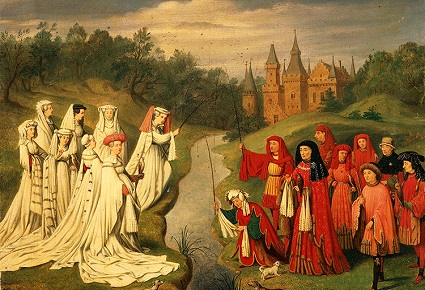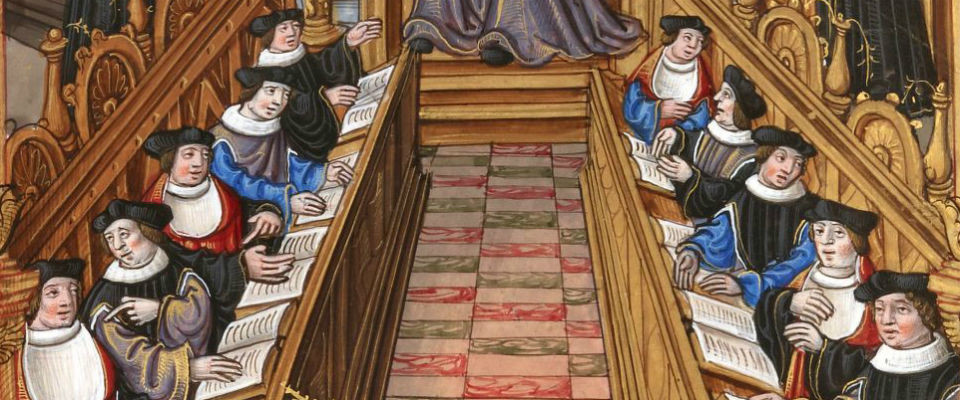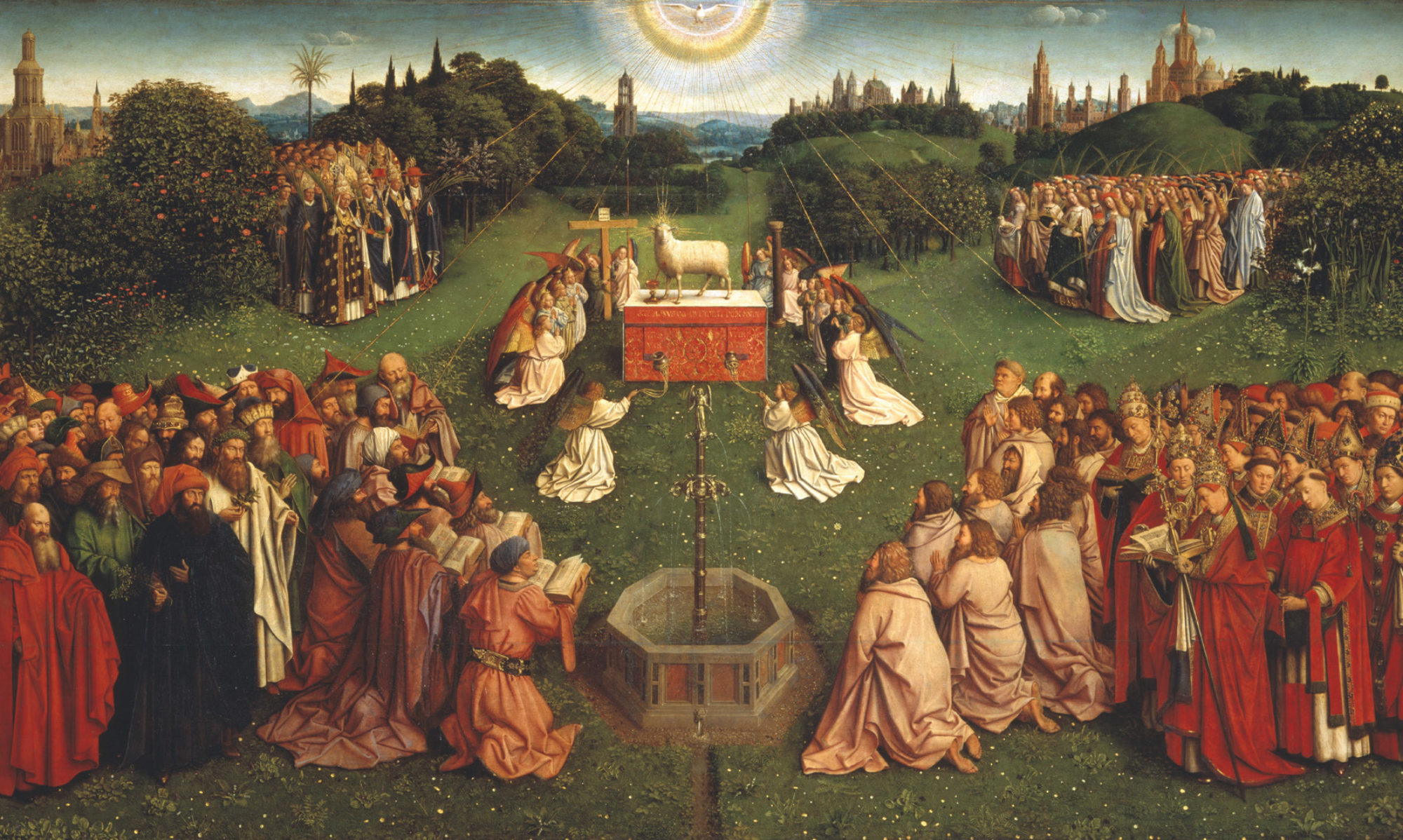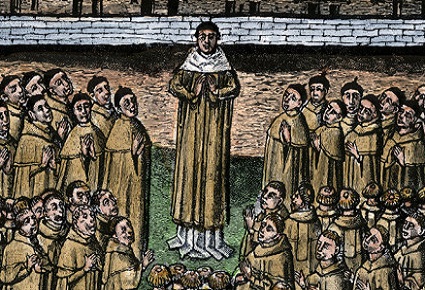Many of the challenges in the Church and world today could be rectified if more Catholics were also devoted medievalists. But what does it mean to be a medievalist, and why should every devoted Catholic also be a medievalist? Can one be a medievalist in the modern world? In this article, we will step back and take a look at some of the basic reasons why every Catholic ought to be a serious scholar and lover of all things medieval.
In the first place, all Catholics should take a lively interest in the events and culture of the Middle Ages for no other reason than that the medieval period is the Catholic age par excellence. In the Middle Ages we see a civilization that is distinctively Catholic in every respect. The creation of the kingdoms of the medieval world were intimately bound up with the growth of the Catholic Church throughout Europe; medieval education and law and the administration of many official offices of government were in the hands of Catholic clerics; Catholic thinking permeated culture at every level, from the sublime theology of the universities to the rude superstition of the peasant – and the authority of the pope and the episcopacy was taken extremely seriously by the secular rulers, to the degree that to run afoul of the papacy was to court excommunication and disaster (Henry IV) or possible loss of lands (King John of England). Therefore, any Catholic ought to take an keen interest in medieval history simply because this was a period in which the Catholic Church enjoyed a prominence that has been unparalleled in subsequent history.

Second, we could point out that many of our traditions in the Catholic Church are either medieval in their origin or come to us from the patristic era through the medium of the medieval world. It is good to remember how very long the Middle Ages were; depending on how we measure when they began and ended, they cover a period of roughly 1,100 years. Thus everything the Church is and does bears the stamp of medieval influence. This is true of liturgical practices, feast days, private devotions, vestments, architecture, our theological vocabulary (“transubstantiation”, a medieval word) and many of the traditions surrounding the papacy, all of which were molded by the medieval Church. However much some modern Catholics may want to distance themselves from the Church’s medieval history, the Catholic Church, in its fundamental development, is a medieval reality. This is not to deny its historical origins in the patristic era, but it is to point out that there is nothing in the Church today that did not pass through the filter of medieval thought. To deny the medieval elements of the Church is to deny the Church itself.
An example of this is Scholastic theology. The immense influence of medieval Scholastic theology on the subsequent development of the Church, and western philosophy, cannot be overstated. This is true both in the positive and the negative: in the positive sense, the Church by the 16th century had adopted the Scholastic method, specifically the teachings of Aquinas, and the subsequent theological direction the Church took was largely influenced by the methods of Aquinas – which were adopted as the Church’s most preferred method of theological inquiry by Pope Leo XIII in the 1879 encyclical Aeterni Patris. This in turn spawned a renewal of interest in Scholasticism in the 20th century. In the negative sense, the developments in philosophy and science in the modern world that occurred in the 17th and 18th centuries were largely reactions against Scholasticism. Descartes, Voltaire, and most of the thinkers of the Enlightenment were initially educated in the Scholastic method and later developed their own deviant philosophies as reactions against Scholasticism. Their philosophies were of course destructive introductions into western thought, but whatever we think about them, we cannot deny the influence of their philosophies, nor that they emerged in reaction to Scholasticism. Thus, in the positive and negative senses, the medieval fact of Scholastic theology was the dominant fact in the development of western philosophy.

Third, we could state that a proper understanding of the medieval times is not only necessary for a full knowledge of Catholicism, but for comprehending the modern world itself. The foundations of modern world all lie in the Middle Ages, either in the social institutions and concepts that have endured from the medieval period, or in changes that have come about by a conscious attempt to destroy medievalism. As in the case with Scholastic philosophy, most things in the modern world have either endured from the Middle Ages or been created to replace what was medieval.
An example of the former is many of our common political ideas about the role of government and the role of the Church in relation to each other. The common notion shared by all in the west of the Church and State occupying complimentary but truly distinct spheres of authority has its origin in the disputes of the Middle Ages, such as the Investiture Controversy. In modernity the sphere occupied by the Church seems to shrink and shrink, but nevertheless the concept of distinct spheres of authority is a medieval one.
An example of something created to displace another thing medieval is our modern capitalist system of free enterprise, which began in England with the Enclosure Movement as a direct attack on the self-sufficient villages of the medieval yeoman. This was done to further the capitalist enterprise of wool-making by turning farmland into grazing land and by forcing dispossessed peasants into nascent capitalist factories. This system of turning peasants into factory workers was so lucrative for the landowners (and so difficult to resist by the peasants who did not have the legal means to fight it) that it was soon replicated all over Europe, ushering in the Industrial Revolution and the modern age with all its attendant filth, to which every sane person ought to prefer the balance and harmony of the Middle Ages to the insanity of the modern world. Thus, for good or for ill, the very concepts that frame the way we understand the world and society are strongly connected to the medieval world.
Speaking of harmony and balance, the number one reason perhaps that a Catholic ought to devote himself to the study and appreciation of the Middle Ages is due to the medieval quest for balance, harmony, and order in the universe. This quest was the philosophical linchpin of the entire medieval intellectual edifice. The medievals rightly understood that the world, as a creation of God, was a world in which things made sense – everything had its proper place, and God has “ordered all things in measure, and number, and weight” (Wis. 11:20). Thus, there was nothing that did not fit into the divine plan in some manner. There was only one Truth, and all other Truths had to be reconciled with what was known by the light of God’s revelation.
Thus the medievals, more than any other men, sought to find the delicate balance between faith and reason, between Church and State, free will and God’s providence, personal devotion and sacramental hierarchy, the institutional and the spiritual, military prowess with evangelical gentleness, the the rights of the individual and the rights of the community, the equality of all men before God and the distinction of social class. The most astounding accomplishment of the medievals is not found in their architecture or in their scholarship, but in the fact that they successfully harmonized not just one or two but all of these various ideas and concepts in a way that the ancient world and modern world have never been able to even come close to doing.
Medievalism was all about harmony. Medieval historian Norman F. Canton once suggested that the collapse of the medieval world was not due to external factors like plague and war (and certainly not emergent capitalism), but to intellectual developments that threw the medieval harmony off balance; men became tired of the balance that medieval civilization required and came to prefer either faith or reason, Church or State, but could no longer endure both. This theory seems very plausible.
Yet, despite the clear contributions made by medieval civilization, many are held back from an embrace of things medieval by the alleged bad things about the Middle Ages: the poor state of technology, hygiene, some legal practices, etc. Surely, we don’t want to go back to medieval surgery or Trial by Combat?

It must be remembered that a devoted medievalism need not mean we affirm everything about the Middle Ages. Clearly, not everything about the Middle Ages was good; the fact that we are enthusiastic about medieval architecture does not mean we need to be enthusiastic about medieval dentistry. A great example is the manorial or feudal system. The manner in which the landed nobility exploited the labor and lands of the peasant class for the majority of the Middle Ages is not a situation any Catholic would be willing to replicate these days. The self-sufficiency of the peasant village is worthy of admiration, and many Catholic medievalists, like Hilaire Belloc and J.R.R. Tolkien, saw in the medieval village a prototype of the ideal social and political arrangement; it is well known that Tolkien’s Shire was based on his concept of a medieval English village. But we ought not to confuse our admiration for the self-sufficiency of the peasant enterprise with the parasitic political arrangement by which the nobles extracted service and production from their serfs. Though feudalism was a large part of the medieval landscape, the two are not synonymous. Five centuries of medieval history had elapsed before the advent of the feudal system, and the feudalism was dying out during the last two centuries of the medieval period. Feudalism was a system that arose out of the Middle Ages and gained traction for a time, but we need not affirm it as either a just or ideal political arrangement.
We may thus recognize in certain aspects of the feudal system a defect in the political arrangement of the Middle Ages. Similarly, we need not be enthusiastic for defects in other areas, such as law (no Catholic would be eager for the renewal of Trail by Ordeal or the legal acceptance of the practice of torture), medicine or material technology. Every era has its strengths and defects, the Middle Ages being no different.
We also should remember that many of the things we find objectionable about the Middle Ages were also objectionable to the medievals themselves. We sneer at the concept of Trial by Ordeal as a form of justice, but so did the medieval Church, and the Fourth Lateran Council abolished it. Many abuses we associate with the medieval world were also considered abuses by the medievals themselves.
We ought to back up and ask ourselves what are we admiring when we admire medieval civilization? Ultimately we are not admiring a theological system, or a political arrangement or styles of archaeology, but a specific sort of worldview, a worldview grounded solidly in the Catholic Tradition and that has certain expressions in art, literature, etc. We may marvel at these varied expressions of the medieval worldview, but we should not confuse them for the worldview itself.
The medieval worldview we ought to emulate is one that sees God as the head of the social hierarchy and understands all authority as emanating from Him and returning to Him – all things from God and all things for His glory. Man is ordered towards God.
The medieval worldview is one of profound harmony, when Truth is recognized as unitary and all other lesser truths and disciplines are reconciled in light of that one Truth. Thus, there can be no contradiction between faith and reason or true discord between the place Church and State. Everything has a place in the tapestry of truth; it is the glory of God that He has woven this tapestry and the glory of man to harmonize all things within it.
This is what it means to be medieval in the most basic sense, and it is this worldview of harmonizing all things in God and referring all things back to God (culture, art, government, etc) that medieval civilization reaches its highest peak. We may consider ourselves more advanced in many ways than the medievals, but in looking at the intellectual and spiritual synthesis they attained, we realize how pitifully far we have fallen.
Phillip Campbell, “Catholicism and Medievalism,” Unam Sanctam Catholicam, September 27, 2012. Available online at http://unamsanctamcatholicam.com/2022/05/catholicism-and-medievalism

